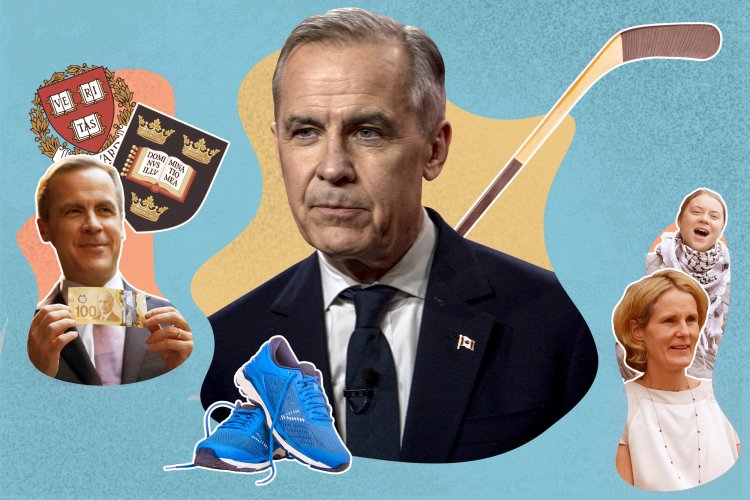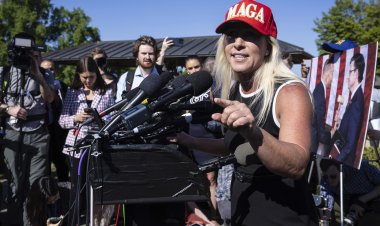55 Insights on Mark Carney, Canada’s Future Prime Minister
The leader of the Liberal Party takes over from Justin Trudeau.

Carney, who is 59, has an extensive background in banking and is known for his advocacy of climate initiatives. He embodies the globalist perspective typical of elite circles, which has recently fallen out of favor in Washington. While he has contributed significantly to public service, his experience does not include holding public office. A passionate ice hockey fan, he has also been spotted in the Royal Box at Wimbledon.
Despite his impressive credentials, Carney has appeared somewhat uneasy in his new political role, openly admitting that he is not a natural politician. This has been evident, especially as he faces criticism from the Conservative Party, which has labeled him as “sneaky carbon tax Carney.” He is trying to present himself as a capable financial crisis manager, particularly amid the trade tensions initiated by Donald Trump. However, his expertise is being challenged by Conservatives, including former Prime Minister Stephen Harper, who asserts that it was the finance minister, not Carney, who made crucial decisions during the economic downturn that followed the fiscal crisis.
“Communicate clearly, frequently and honestly,” Carney advised in his 2021 book *Value: Building a Better World For All*. “You can’t spin your way out of a crisis. The truth will come out.”
If Carney initiates a snap election, he might earn the dubious distinction of being Canada’s shortest-serving prime minister. Recent polls indicate that Conservative leader Pierre Poilievre is the frontrunner, although the gap between the Liberals and Conservatives has narrowed to six points as the year progresses.
What should the world know about Canada’s new prime minister before he embarks on his term? Here’s a curated overview of key details about Mark Carney, drawn from interviews, comprehensive profiles, public speeches, and his own writings:
1. His signature appears on Canadian currency.
2. He has never held a public office.
3. He was once referred to as “the George Clooney” of central banking. “It’s a very low bar,” he retorted.
4. As U.N. special envoy for climate action and finance, his annual salary was $1.
5. He was the first non-British individual to govern the Bank of England since its establishment in 1694.
6. Each morning at the U.K. central bank, he recited a phrase from Marcus Aurelius: “Arise to do the work of humankind.”
7. Carney was the second-youngest governor of the Bank of Canada at age 43.
8. He is the only person to lead the central banks of two different countries.
9. He displayed a small map of “breathtaking” County Mayo, Ireland, at his office in the Bank of England to honor his grandfather, who immigrated from there to Canada.
10. Carney was born on March 16, 1965, in Fort Smith, Northwest Territories, a small town located nearly 3,000 miles from Ottawa.
11. He has written that growing up in Canada’s far north taught him about being a “small — and humble — element of an integrated ecosystem.”
12. His parents were both educators; his father served as a high school principal. “Our house was filled with books, and there was lots of discussion on the issues of the day,” he mentioned.
13. Carney is the third of four children, with two brothers and a sister. “He stands up to bullies,” noted his younger brother Brian in a campaign testimonial.
14. When he was 6, his family moved to Alberta, where he credited the capital for instilling in him “Edmonton characteristics” such as hard work and good judgment.
15. He was also a newspaper delivery boy for the Edmonton Journal.
16. In his teenage years, he competed on both English and French teams in Reach for the Top, a game show that posed challenging academic questions.
17. Carney has been an Edmonton Oilers fan since the team's glory days in the 1980s. “I certainly had firm views that I was going to play in the NHL.”
18. While he did play hockey, he only reached the role of third-string goaltender for Harvard’s varsity team, appearing in one game against Colgate and stopping all shots faced.
19. Carney attended Harvard on a partial scholarship, majoring in economics under the tutelage of John Kenneth Galbraith.
20. Peter Chiarelli, now vice president of hockey operations for the St. Louis Blues, remarked upon meeting his Harvard roommate: “I remember saying to my friend, ‘That guy’s going to be the prime minister.’”
21. He graduated magna cum laude in 1988 and began his career at Goldman Sachs.
22. An early finance lesson from Bob Hirst, a partner at Goldman, was: “If something doesn’t make sense, it doesn’t make sense."
23. His career saw him living in London, Tokyo, New York, and Toronto, changing jobs approximately every 18 months across three continents over a span of about 13 years.
24. In 1991, Carney decided to pursue higher education at Oxford University, where he earned both a master’s degree and a Ph.D. in economics by 1995.
25. At Oxford, he met Diana Fox, the daughter of an affluent English pig farmer who was also on the university ice hockey team.
26. Carney and Fox married in 1995, and they are proud parents of four daughters.
27. Carney switched from banking to public service in 2003, becoming deputy governor of the Bank of Canada in August.
28. He was recruited by then-Governor David Dodge to take on the top role at the Bank of Canada in February 2008, which Dodge regarded as “one of the most important things I did.”
29. Carney stepped into his role just as the financial crisis began. His inaugural interest rate announcement was a sharp 50-basis-point cut. “The events of the past few weeks in global financial markets have been dramatic,” he informed the Canadian Club of Montreal in September 2008. “Money and credit markets seized up.”
30. He became known as “the rock star banker,” promoting a concept of monetary policy called “forward guidance,” where central banks signal the future trajectory of interest rates.
31. In 2011, he was named “Most Trusted Canadian” by the editors of Reader’s Digest Canada, although readers placed him 19th.
32. In his book, Carney reflects on his past experiences, stating: “Trust can be undermined not just through loss of certainty about the future value of money, but also through the loss of confidence in banks or even a loss in the financial system itself.”
33. He mentions learning about crisis management from fellow central bankers like Ben Bernanke and Christine Lagarde, with one key insight being: “The market can be wrong longer than you can stay solvent.”
34. In 2013, he was brought on board at the Bank of England, coinciding with the onset of Brexit.
35. Reports indicated that his starting salary in the U.K. was £480,000, plus a £144,000 pension allowance, significantly surpassing his predecessor, Sir Mervyn King.
36. Carney expressed discontent when British media scrutinized his wife for “wearing vegan shoes and recycling plastic bags,” according to Chris Giles of the Financial Times.
37. Concerned about public perception as a foreigner heading a British institution, he was reassured that once he ventured north of Birmingham, “the Governor of the Bank of England is an alien. No one will know the difference.”
38. His initial positive reception from the British public was short-lived, as media scrutiny intensified. Carney faced criticism for raising concerns about a “cliff-edge Brexit” and not maintaining a neutral stance. “A public figure receiving a mauling by the British press is like winter in Edmonton,” commented Curtis Gillespie. “The question is not if or when but how bad and for how long.”
39. In 2014, a Labour politician likened the Bank of England under Carney to an unreliable boyfriend — “one day hot, one day cold.”
40. He completed the 2015 London Marathon with a time of 3:31:35, which Business Insider deemed “pretty impressive for a guy who just turned 50.”
41. Carney begins each day with water — “the most important thing for cognitive functioning.” He meditates when pressed for time, asserting in his book: “Trust me, it creates time.”
42. A regular attendee at Wimbledon, he made the list of those in the Royal Box in 2024.
43. He was present at the United Nations when Greta Thunberg delivered her pivotal speech at the U.N. Climate Action Summit on September 23, 2019. “We will not let you get away with this,” Thunberg declared. “Right here, right now is where we draw the line.” The message Carney took away was clear: “With the clarity of youth: We were failing.”
44. After leaving his post at the Bank of England in March 2020, Carney took a role with the U.N. focusing on climate issues and served as an adviser for the U.K. prime minister ahead of COP26 in Glasgow.
45. In 2020, he became part of Brookfield Asset Management, a global investment firm dedicated to climate objectives. However, Canada’s National Post reported that he had yet to resign from numerous corporate boards despite his claims of being “all in” for his leadership bid.
46. "Where I was born is now melting, setting in train a process that releases CO2 and methane, accelerating global warming,” he wrote in *Value*. “The prospect of these feedback loops is becoming likely as the Arctic has warmed by twice the global mean.”
47. Bono, the lead singer of U2 and a climate activist, praised Carney's book, stating on the dustjacket: “Great leadership is not a bullhorn but rather, as Mark Carney shows, a clear set of instructions in a smoke-filled room.”
48. In April 2021, Carney established the Glasgow Financial Alliance for Net Zero, aiming to promote the green transition through a coalition of global banks, asset managers, and insurers. However, since Trump’s arrival, there have been departures of key members amid a climate policy conflict.
49. In 2021, Carney reiterated his openness to politics, stating, “I never say never.”
50. Speculations about his political ambitions grew when he served as a keynote speaker at the Liberal Party convention in spring 2021. During a virtual address, he stated, “I’ll do whatever I can to support the Liberal Party in our efforts to build a better future for Canadians.” He informally advised the Liberal government during the COVID-19 pandemic.
51. Following the release of his first book, which The Guardian characterized as a critique of free-market ideologies, speculation heightened regarding Carney's intentions in politics. “The progressive cause has been advanced,” said reviewer Will Hutton. “The boy from Canada’s Northwest Territories, still slightly incredulous at his own phenomenal career given his modest beginnings, done good.”
52. Carney began formally advising Trudeau as chair of the Liberal Party's Task Force on Economic Growth last fall. With Trudeau's popularity dwindling amid economic issues, rumors swirled about Carney being a possible replacement for Chrystia Freeland as finance minister after her resignation from the cabinet intensified calls for Trudeau to step down.
53. He is the godfather of Freeland's son.
54. “I’m not the usual suspect when it comes to politics,” Carney remarked upon officially entering political life on January 16. “This is no time for politics as usual.”
55. Carney’s book concludes with this guidance: “Be humble. However grand you are today or may become tomorrow, you too will be forgotten.”
Sources: *Value: Building a Better World For All*, CBC News, Business Insider, Cabin Radio, BBC News, The Canadian Encyclopedia, Bloomberg News, Britannica, The Telegraph, Harvard Crimson, The Toronto Star, Reader’s Digest Canada, The Walrus, The Globe and Mail, The Canadian Press, Queen’s University, Maclean’s, Wimbledon, Financial Times, Running Magazine, NPR, Bank of England, Glasgow Financial Alliance for Net Zero, National Post, The Guardian.
James del Carmen for TROIB News
Find more stories on Business, Economy and Finance in TROIB business












